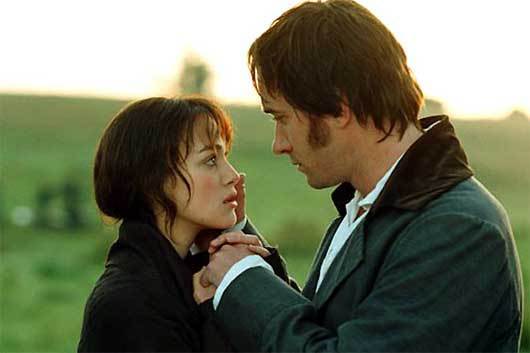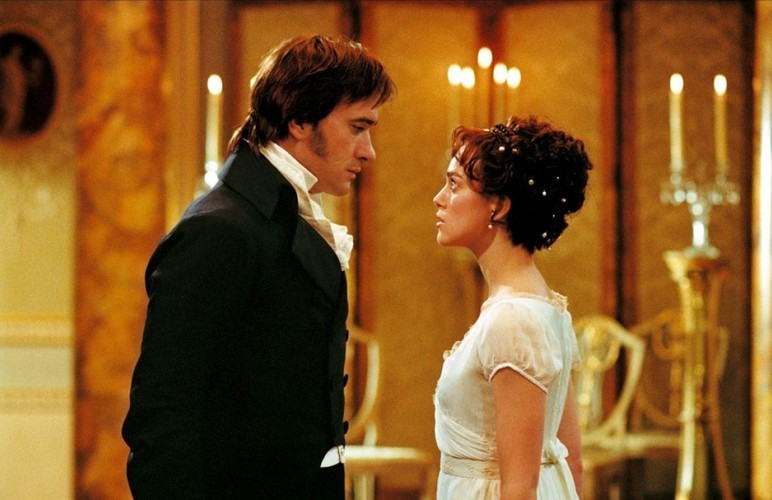 Assignment: For each of the event shown below, assign a point value to each character's attitude toward the other at the time of that event. Justify your scores with specific references to/passages from the text.
Assignment: For each of the event shown below, assign a point value to each character's attitude toward the other at the time of that event. Justify your scores with specific references to/passages from the text. Friday, April 8, 2011
The Development of the Relationship Between Elizabeth and Darcy
 Assignment: For each of the event shown below, assign a point value to each character's attitude toward the other at the time of that event. Justify your scores with specific references to/passages from the text.
Assignment: For each of the event shown below, assign a point value to each character's attitude toward the other at the time of that event. Justify your scores with specific references to/passages from the text. Monday, April 4, 2011
The Olympic Sport of Marriage Proposals- Part 2
 2. Mr. Darcy's proposal to Elizabeth
2. Mr. Darcy's proposal to Elizabeth Sunday, April 3, 2011
The Olympic Sport of Marriage Proposals- Part 1

Sunday, March 27, 2011
The LOOOOOOVE Detective Notebook- Case 2

Assignment:
Also: Here are another person's thoughts on Charlotte and Mr. Collins.
The LOOOOOOVE Detective Notebook- Case 1

Assignment:
Monday, March 21, 2011
Narrator's Hall of Fame (Part 2)
 Here is Part 2 of my "Top 16 Narrative Moments":
Here is Part 2 of my "Top 16 Narrative Moments":9. “To Darcy it was welcome intelligence—Elizabeth had been at Netherfield long enough. She attracted him more than he liked…He wisely resolved to be particularly careful that no sign of admiration should now escape him, nothing that could elevate her with the hope of influencing his felicity, sensible that if such an idea had been suggested his behavior during the last day must have material weight in confirming or crushing it. Steady to his purpose, he scarcely spoke ten words to her through the whole of Saturday…he adhered…to his book, and would not even look at her.”
This is yet another example of Darcy trying to deny his feelings for Elizabeth. He cannot come to terms with the fact the he likes he (“She attracted them more than he liked”) so he resorts to an immature strategy of ignoring her. The fact that he must try increasingly harder to suppress his interest in her shows that his feelings must be growing. Hard as he may try, he can’t escape the age-old adage of “You can’t help who you fall in love with.”
10. “After amusing himself some time with their curiosity, he thus explained. ‘About a month ago I received this letter…It is from my cousin Mr. Collins, who, when I am dead, may turn you all out of this house as soon as he pleases.’ ‘Oh! My dear,’ cried his wife, ‘I cannot bear to hear the mentioned…I do think it is the hardest thing in the world that your estate should be entailed away from your own children…in favour of a man whom nobody cared anything about.” (page 54)
These lines are important because they reveal the true reason why Mrs. Bennet is so focused on marrying her daughters (preferably to men who are well-off). Due to the fact that the estate will go to Mr. Collins when Mr. Bennet dies, Mrs. Bennet is trying to set up a stable life for each of her daughters (which means marrying them off to wealthy suitors.) The reader learns that Mrs. Bennet may at times be “intolerable,” but her heart is in the right place. On another note, this passage shows that Mr. Bennet knows exactly how to push his wife’s buttons…and it is hilarious.
11. “’…But I can assure the young ladies that I come prepared to admire them. At present I will not say more, but perhaps when we are better acquainted—‘... [the girls] were not the only objects of Mr. Collins’s admiration. The hall, the dining-room, and all its furniture were examined and praised; and his commendation of everything would have touched Mrs. Bennet’s heart, but for the mortifying supposition of his viewing it all as his own future property…In a softened tone she declared herself not at all offended [that Mr. Collins suggested that her daughters did the cooking]; but he continued to apologize for about a quarter of an hour.”
This passage highlights some of the oddities of Mr. Collins. He can be polite and humble, but also brags about his connections with Lady Catherine de Bourgh. He seems to mean well, but he gives off a creepy vibe, especially since he is definitely interested in marrying one of his cousins. In general, his mannerisms and way of going about things are just odd. (ex. He profusely apologizes for every small social “misstep” that he makes.)
12. “Mr. Bennet’s expectations were fully answered. His cousin was as absurd as he had hoped…By tea-time however the dose had been enough, and Mr. Bennet was glad to take his guest into the drawing room…glad to invite him to read aloud to the ladies. Mr. Collins readily assented, and a book was produced; but on beholding it…[he] protested that he never read novels.—Kitty stared at him, and Lydia exclaimed—Other books were produced, and…he chose Fordyce’s Sermons. Lydia gaped as he opened the volume, and before he had, with very monotonous solemnity, read three pages, she interrupted him…” (page 60)
I chose this paragraph because it manages to highlight the qualities of a few different characters. Mr. Bennet is shown to be clever (he thinks Mr. Collins is hilarious, but knows how to get rid of him when he’s had enough) while Mr. Collins is portrayed as oblivious to everything. This passage also reinforces the fact that Kitty and Lydia are airheads, and that Lydia is bold (or rude) enough to defy societal rules. Austen highlights her bold spirit for a reason, as she will make some interesting decisions later in the novel…
13. “Darcy corroborated it with a bow, and was beginning to determine not to fix his eyes on Elizabeth, when they were suddenly arrested by the sight of the stranger, and Elizabeth happening to see the countenance of both as they looked at each other, was all astonishment at the effect of the meeting. Both changed colour, one looked white, the other red. Mr. Wickham, after a few moments, touched his hat—a salutation which Mr. Darcy just deigned to return. What could be the meaning of it?” (page 63)
I like this passage because it makes me want to learn the back-story of two characters that I know little about. (Or pretend to know little about, since I have already read this book.) Even after Mr. Wickham explains his dislike for Darcy, I still want to hear Darcy’s side of the story, which means that I will have to continue reading the book. I find it interesting that we are not told who “looked white/red” when the men “changed colour”; this knowledge would give us more information about what transpired between them in the past. The fact that Mr. Darcy and Mr. Wickham have a “history” relates to the theme in this novel that everything is intertwined and everyone will eventually get mixed up in the intrigue.
14. “I had not thought Mr. Darcy so bad as this—though I have never liked him, I had not thought so very ill of him—I had supposed him to be despising his fellow creatures in general, but did not supect him of descending to such malicious revenge, such injustice, such inhumanity as this!” –Elizabeth Bennet (page 70)
The scene from which this quote is taken is important because it radically alters Elizabeth’s perception of Mr. Darcy. He seemed to be growing on her, but Mr. Wickham’s story has her convinced that he is truly a horrible person. Little does she know that Mr. Wickham is not what he seems, and there are two sides to every story. It is also interesting to note that when Elizabeth speaks of Miss Darcy, Mr. Wickham says, “But she is nothing to me now.” Was she “something” to him before?
15. “…though I must throw in a good word for my little Lizzy.” “I desire you will do no such thing. Lizzy is not a bit better than the others; I am sure she is not half so handsome as Jane, nor half so good-humoured as Lydia. But you are always giving her the preference.” “…they are all silly and ignorant like other girls; but Lizzy has something more of quickness than her sisters.”—Mr. and Mrs. Bennet (pages 6-7)
This part of Mr. and Mrs. Bennet’s initial conversation should be noted because it gives the first tidbit of information on Elizabeth Bennet, a prominent character in the novel. In the lines preceding this one, the reader has gathered that Mr. Bennet is calm and rational, whereas Mrs. Bennet is somewhat of a dingbat. This means that the reader values Mr. Bennet’s opinion of his daughters more than that of Mrs. Bennet, who honestly has no idea what she is talking about.
16. “Had she found Jane in any apparent danger, Mrs. Bennet would have been very miserable; but being satisfied on seeing her that her illness was not alarming, she had no wish of her recovering immediately, as her restoration to health would probably remove her from Netherfield.” (page 37)
Mrs. Bennet may not be conventionally intelligent, but she definitely knows how to scheme, and this passage proves it. She is very pleased that Jane is not deathly ill, yet is sick enough to be forced to remain at Netherfield. Mrs. Bennet figures that Jane staying there will lead to her spending more time with Mr. Bingley which will inevitably lead t0 marriage. (of course) As I said before, Mrs. Bennet may not be the smartest woman in the world, but she knows how to get what she wants.